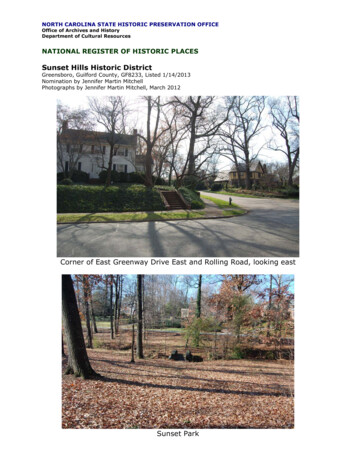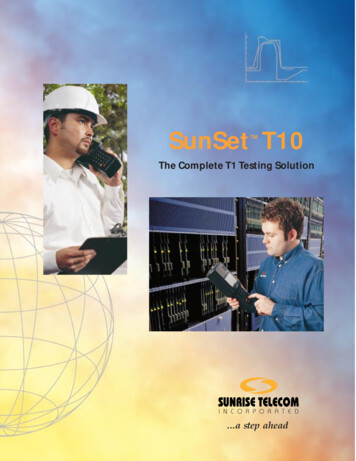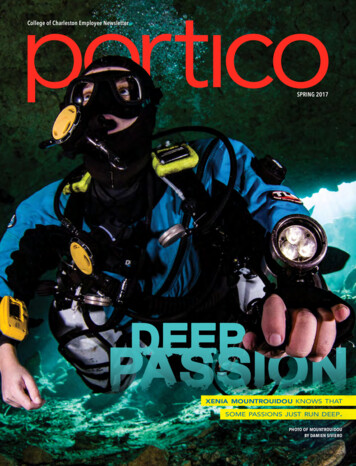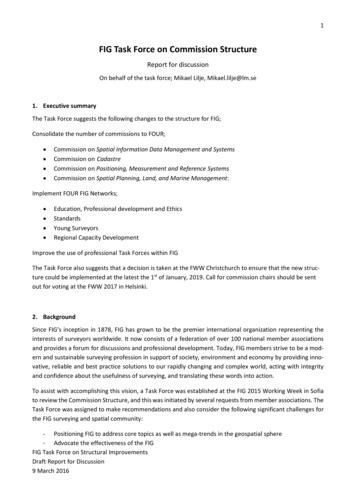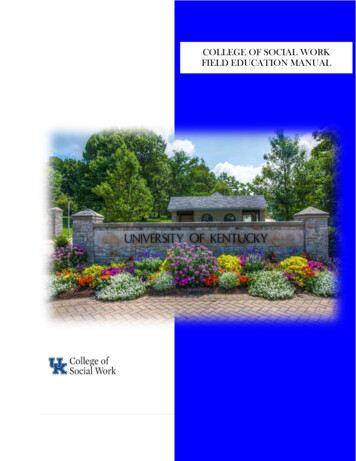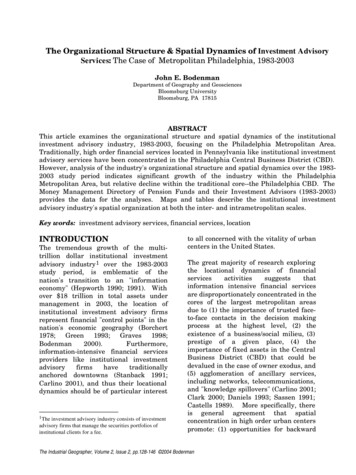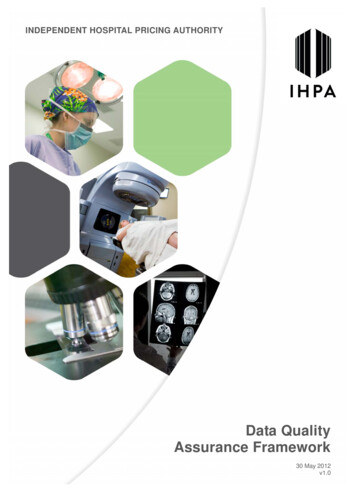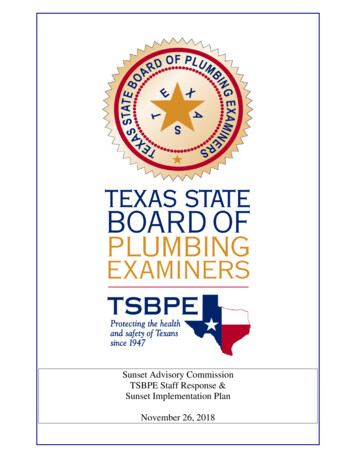
Transcription
Sunset Advisory CommissionTSBPE Staff Response &Sunset Implementation PlanNovember 26, 2018
TEXAS STATE BOARD OF PLUMBING EXAMINERSTexas State Board of Plumbing ExaminersLICENSES, REGISTRATIONS, AND ENDORSEMENTSCurrent & 775,00072,86370,00070,04371,12665,00060,000FY 2012FY 2013FY 2014FY 2015FY 2016FY 2017FY 2018
Texas State Board of Plumbing Examiners (#456)Revenue AnalysisAs Of August 31, 2018REVENUES COLLECTED:Comp Object 3175 - License & Registration FeesComp Object 3175 - Texas.Gov FeesComp Object 3717 - Administrative & Civil PenaltiesComp Object 3775 - Returned Item FeesTotalsFY 2018ActualFY 2018/2017% ChangeFY 2017ActualFY 2017/2016% ChangeFY 2016ActualFY 2016/2015% ChangeFY 2015ActualFY 2015/2014% ChangeFY 2014ActualFY 2014/2013% ChangeFY 2013ActualFY 2013/2012% ChangeFY 2012Actual 4,892,099157,482267,3801,3252.9%1.4%36.7%89.3% 4,754,454155,326195,6567002.4%-1.7%-18.5%16.7% 4,644,758158,052239,9946002.0%5.7%10.1%-25.0% 4,551,521149,522217,8868005.8%2.5%16.8%10.3% 4,302,150145,908186,5607258.1%0.4%-16.7%-21.6% 3,981,077145,267224,0359252.6%3.8%19.1%-5.1% 3,880,729139,882188,073975 5,318,2864.2% 5,106,1361.2% 5,043,4032.5% 4,919,7296.1% 4,635,3436.5% 4,351,3043.4% 4,209,659FY 2018ActualFY 2018/2012% ChangeFY 2012Actual 4,892,099157,482267,3801,32526.1%12.6%42.2%35.9% 3,880,729139,882188,073975 5,318,28626.3% 4,209,659Yearly Comparison:REVENUES COLLECTED:Comp Object 3175 - License & Registration FeesComp Object 3175 - Texas.Gov FeesComp Object 3717 - Administrative & Civil PenaltiesComp Object 3775 - Returned Item FeesTotalsFY 2018Fiscal YearActualFY 2017Fiscal YearActualFY 2018/2017% Change 4,892,099157,482267,3801,325 4,754,454 155,326 195,656 7002.9%1.4%36.7%89.3% 5,318,286 5,106,1364.2%
TSBPE Staff Response & Sunset Implementation PlanNovember 26, 2018Page 5 of 43TSBPE STAFF RESPONSEPlumbing is a profession that significantly impacts the health, safety and welfare of the public.The Texas State Board of Plumbing Examiners (“TSBPE”) has provided quality oversight of theplumbing industry in furtherance of its mission to ensure the safety, health, and welfare of thepublic as it relates to the usage of plumbing systems.Issue 1Recommendation 1.1 – Transfer the regulation of plumbers to the Texas Department ofLicensing and Regulation, and reconstitute the independent plumbing board as an advisoryboard.TSBPE Staff Response: Board staff disagrees with this recommendation.1.1.1 Critical lack of resources. As reflected by the chart on the previous page,the Board has, for nearly a decade, experienced steady growth in its responsibilities due toTexas’ prosperous and rapidly-growing economy and sharp population growth which has fueledconstruction and driven up the need for licensed plumbing professionals in the industry. Agencyappropriations and staffing levels have not kept pace.Board staff asserts the Board’s deficiencies are due to a critical shortage ofresources. The Board has done well with the appropriations it has received, and has consistentlypoured money back into the General Revenue Fund (most recently 2.6 million), over and aboveits appropriations. Board staff does believe that wholesale change is needed in order to addressthe critical shortage of plumbers in the industry, and welcomes several changes recommended bySunset that will assist the Board’s efforts in that regard. However, after being consistentlydenied even modest increases in its budget to restore staffing and budget cuts, let alone growstaffing levels to meet continually rising demands, the Board has understandably becomereluctant to make massive appropriations requests of the sort wholesale change would require.Sunset staff, at Issue 1, pg. 11, takes the position that the Board failed toadequately address its customer service workload by requesting additional employees. However,in the three previous biennia prior to this year, the Board requested a licensing technicianposition whose primary duties would include answering customer service calls to the LicensingDepartment – precisely the customer service role highlighted by Sunset staff. All such requestswere denied. As a result, the Board shifted its strategy and this year requested a customerservice representative in its Enforcement Department. However, the Board currently has anemployee in its Licensing Department that splits their duties between Licensing andEnforcement. Approval of the new Enforcement Department position would allow the splitemployee in Licensing to dedicate their time solely the customer service workload in Licensing,and would operate to improve staffing levels in that department.
TSBPE Staff Response & Sunset Implementation PlanNovember 26, 2018Page 6 of 43Without sufficient staffing, the Board filled in gaps by utilizing temporaryworkers, which tends to promote turnover. Temporary workers require training from other staffmembers, inefficiently distracting them from their regular duties. Due to turnover, temporaryworkers also have diminished capacity to acquire institutional knowledge and become moreeffective in their tasks.The Board was also forced to offer more overtime compensation (approximately1,000 total hours per month, on average), in order to stretch its workforce to the demands of theagency. These efforts achieve short term gains, but are ultimately unsustainable. Specifically, inMarch, June, and September of 2018, the Examinations Department and related support staffworked three Saturdays providing examinations in order to reduce the queue for the exam. TheBoard is currently in the process of scheduling additional Saturday examinations dates slated forspring, 2019.In its Strategic Plan for 2019-2023 TDLR trumpets, utilizing a chart, its licenseeto-employee ratio as a marker of its efficiency as an agency. Specifically, TDLR touts its ratioof 1,766 licensees for every employee of TDLR. Sunset staff, at Agency at a Glance, pg. 7,recites the licensee count of TSBPE as of July, 2018 as 58,624. However, while this captures the“people” count of the licensee population, it does not capture the total licensing workload, whichincludes the supplemental endorsements and registrations maintained by the Board (excludinglicense ranks subsumed under a higher license rank (a Master Plumber retains their JourneymanPlumber license in the system)).When including these supplemental license types (8,150 as of July 15, 2018), thetotal current license count is 66,774. Application of TDLR’s license-to-FTE ratio to this figureresults in a Board equivalent of 37.8, over 20% more employees than the Board currently has,and more employees than the Board has had at one time in its entire existence. Moreover, asdiscussed, infra., TDLR does not administer its own examinations. Therefore, a more accuratecomparison of staffing levels would ignore the Board’s examinations staff of 4.5, meaning theBoard has a TDLR-equivalent of 26.5 employees; meaning that application of the license-to-FTEratio would result in over 40% more employees than the Board currently staffs.Although Sunset staff does concede the agency has “limited resources”, Sunsetstaff was not tasked with, and has not considered, what the Board might be able to accomplishwith increased funding, and armed with the valuable recommendations and insights of the Sunsetprocess. Board staff asserts that, particularly in light of chronically low levels of funding, theBoard should be given the opportunity to promote reforms within the agency, rather than relyingon past performance without appropriate resources to conclude, based upon supposition alone,that TDLR would better protect the public.1.1.3 Resolving Industry staffing issues is a concern, but must not come at theexpense of the public’s health and safety. The Board has, for a long time, been asked to do morewith less. When “treading water” due to critical shortages is a daily struggle, it is difficult topursue and realize sweeping reforms to address industry staffing needs.
TSBPE Staff Response & Sunset Implementation PlanNovember 26, 2018Page 7 of 43Moreover, fulfilling industry staffing needs and guaranteeing a licensed plumberfor every available plumbing job across the state is not the statutory charge of the Board.Safeguarding the health and safety of the public by ensuring that a person entrusted with alicense issued by the Board is actually competent and fit to perform plumbing in the field is theagency’s mission.Industry staffing needs are an important consideration, but should not come at thecost of the public’s health and safety. The framework of recommendations envisioned by Sunsetstaff allows industry staffing needs to inform and dictate appropriate regulation and safety, byremoving examination requirements.These efforts would doubtless push additional plumbers into the field, but wouldexpose the public to risk at the same time by elevating quantity over quality. Board staffbelieves that quantity should be increased by adopting many of the statutory changes identifiedby Sunset, and expanding the Board’s examinations operations to increase output. However,quality, in the form of established minimum competency of the design and function of a basicplumbing system by the plumber, should remain. Expansion of the Board’s examinationsoperations will require investment and growth in the agency.Board staff, knowing that the Sunset process was forthcoming believed, perhapsnaively, that the Sunset process would shine a light on the critical shortage of resourcesexperienced by the Board, and would prompt an increase in appropriations, in addition to theother helpful suggestions of Sunset. Regrettably, this Sunset review was delayed by two biennia.1.1.4 Transferring operations to TDLR does not substantially improve the fiscaloutlook to the state. While the fiscal implications of adopting Recommendation 1.1 are portrayedby Sunset staff as positive, if one unpacks these implications and reviews them closely, it wouldappear that the savings to the state appears to be owing less to the managerial efficiencies ofbeing “housed” at TDLR, and more to eliminating the duties associated with administeringexaminations by outsourcing examinations to a third party administrator, including eliminationof the practical exam.While the Sunset staff report does not explicitly state this, Board staff believes astraightforward reading of the entire report implies that an assignment of its operations to TDLRwould involve eliminating the self-administration of all examinations (Summary of Sunset StaffRecommendations, pg. 3; Issue 1, pgs. 16, 17; Issue 2, pg. 29; Sunset staff recommendations 1.1,2.4, 2.10). The natural result of implementing Sunset staff recommendations 1.1, 2.4 and 2.10and eliminating self-administration of all examinations is that the duties of the ExaminationsDepartment would be outsourced, and all of the Board’s employees hired as examiners would beeliminated.This dynamic would be in keeping with Board’s staff understanding of TDLR andits operations, in which TDLR does not administer its own examinations. Specifically, uponinformation and belief, TDLR has a preexisting relationship and uses a third party administrator,
TSBPE Staff Response & Sunset Implementation PlanNovember 26, 2018Page 8 of 43PSI Services LLC, to administer written examinations for several of its licensing programs,including its electrician and heating, ventilation and air conditioning (HVAC) programs. Boardstaff presumes that TDLR would similarly utilize this same third party administrator for theprovision of the plumbing examination.The Sunset staff report supports this conclusion when, at Summary of SunsetStaff Recommendations, pg. 3, it concedes each of the Board’s employees, other than itsexaminations staff, would need to be maintained at TDLR (see also Issue 1, pg. 17).TheSunset staff report further notes the total compensation for its examiners positions totals 263,000. Meanwhile, after substantial initial costs of 250,000 to the state are disregarded, theyear-to-year cost savings attributed to the move is 407,535 each year. After removing thisemployee compensation total, the year-to-year savings for the state totals 144,435.Board staff disagrees with some of the recommendations made concerning theexamination as described herein, infra. However, if these recommendations are neverthelessadopted, the Board could effect 64.5% of the same cost savings presented by Sunset staff byeliminating its examiners just as would TDLR, and without incurring any of the costs associatedwith making the transition. While Sunset staff may choose to describe TDLR’s ability toeliminate employee positions for agency duties that have been eliminated as “processimprovements”, Board staff asserts that these process improvements are not unique to TDLR,and the Board could similarly implement same.Board staff surmises that the balance of the remaining 144,535 year-to-yearsavings is derived from no longer needing the Board’s current facility. However, maintaining aseparate facility for the Board’s functions arguably does have some intrinsic value in the event ofa natural disaster, by reducing the state’s exposure to such disasters, spreading out stateoperations. With the separate facility, the Board would maintain its ability to assist otheragencies that might be compromised by a disaster.Moreover, to the extent Sunset staff’s recommendations are adopted and theBoard’s examinations are outsourced to a third party, including elimination of the practicalexamination, the requirement of a facility with the specialized tools, materials and equipment toperform the practical examination would be eliminated, and the Board’s operations could belocated anywhere at that point. In that event, given the long-term vision for the CapitolComplex, the Board’s operations, like many other agencies, would likely be moved to thatcomplex, obviating any savings connected to the Board’s current facilities.Meanwhile, the Sunset staff report is wholly silent with respect to any costsassociated with securing a third party to administer examinations. Board staff asserts that ameaningful evaluation of the fiscal implications in eliminating the self-administration ofexaminations and utilizing a third party administrator should include analysis and frankdiscussion of the costs for third party administration.1.1.5 Similarities with TDLR. The Board has worked well with TDLR in thepast, and holds the agency and its leadership in high regard. However, Sunset staff’s
TSBPE Staff Response & Sunset Implementation PlanNovember 26, 2018Page 9 of 43recommendation 1.1 is predicated on the supposition that TDLR will inherently do a better job,when the Board and TDLR share many similarities, and many of the criticisms levelled at theBoard are also true of TDLR. Board staff draws upon these similarities, not for purposes ofcritiquing TDLR or its performance, but for purposes of highlighting the seeming incongruity ofsome comments in the Sunset staff report.Sunset staff, at Issue 1, pg. 11, notes Board staff’s criticisms of its licensingdatabase system, Versa. Sunset staff further criticizes the Board for its perceived failure to fullyutilize Versa features, and failure to seek training on its use. However, TDLR, in its recentStrategic Approach for the Development of a Licensing and Regulatory System – ExecutiveSummary, recently said of Versa: “[t]he Versa product has been very challenging for the agency . . Versa is clunky to maintain, vendor support is slow, resources to help with the system arevirtually impossible to find, and the system has turned out to be costly to maintain” (underlinedemphasis added).Sunset staff, at Issue 3, pg. 31, and by and through recommendation 3.4, takes theposition the Board has somehow failed to safeguard the public by failing to adopt a formalwritten policy by rule governing the prioritization of complaints. Board staff agrees with therecommendation to adopt a formal policy by rule, but strenuously disagrees that it has exposedthe public to risk. The Board prioritizes complaints effectively, despite there not being a rigidformal policy. Sunset staff implies that adherence to a formal prioritization policy somehowremoves subjectivity in prioritizing complaints. While guidelines for prioritization are helpful,ultimately, a person must classify the complaint, and subjectivity cannot be eliminated entirely.In many instances Board staff actively responds to complaints that would be a top priority fasterthan any complaint processing procedure containing prioritization could occur, resulting in a deescalation of priority before a priority was ever assigned, as discussed hereinafter, infra.However, Board staff would note that TDLR similarly does not appear to have implemented byrule a formal framework for the prioritization of complaints.Sunset staff, at Issue 1, pg. 13, and by and through recommendation 1.2, alsotakes issue with the Board’s handling of criminal background checks. While the Board isappreciative of Sunset staff’s insights regarding the Board’s authority to conduct fingerprintbackground checks, and plans to implement same as discussed hereinafter, infra., Board staffwould note that TDLR also does not conduct fingerprint-based background checks of thelicensees in its electrician and HVAC licensing programs, despite being similarly authorized todo so currently.Sunset staff, at Issue 3, pgs. 32, 33, and by and through recommendation 3.1,deems as insufficient the Board efforts to make the disciplinary history of its licensees availableto the public. Specifically, Sunset staff believes the public should have the ability to search forand review disciplinary history information online. Board staff agrees with the recommendationand plans to implement same. However, Board staff would note that TDLR presently does notoffer disciplinary history online for its licensees holding an electrician’s license or HVAClicense. The Board’s public-facing online system presently provides the individual’s name,license status, and phone number.
TSBPE Staff Response & Sunset Implementation PlanNovember 26, 2018Page 10 of 43Sunset staff, at Issue 1, pg. 13 describes as burdensome the Board’s rulesrequiring a Master Plumber to include their license number on advertisements and on servicevehicles utilized by the plumbing company. Board staff would note that TDLR imposessubstantially similar requirements on its electrical contractor licensees (16 Tex. Admin. Code §73.51(d), (e)) and HVAC contracting companies (16 Tex. Admin. Code § 75.71(g), (h)).Moreover, many requirements concerning signage displayed on service vehicles are alreadyrequirements of many municipalities and other political subdivisions.Sunset staff, at Issue 1, pg. 13 describes how the Board’s complaint resolution time grewto over 6 months in 2017. Board staff would note that for FY2018, complaint resolution timewas reduced to 5.7 months, bringing the four-year average from 2015-2018 to 5.65 months.Sunset staff, at Issue 1, pg. 14, recites TDLR’s complaint resolution time as 4.7 months for 2017,or 20% less than the Board’s average. While the figure recited for TDLR is obviously better,Board staff asserts the two figures are not shockingly disparate, particularly in light of theBoard’s lack of staff to improve those figures. Specifically, the Board, in its most recentLegislative Appropriations Request, has requested two additional Field Representatives to assistin this regard. Moreover, the Board presently has two Field Investigator positions that areunfilled. With additional staffing, and the allowance for Plumbing Inspectors to serve as FieldRepresentatives, as recommended by Board staff in connection with Sunset staffrecommendation 3.1, Board staff is confident complaint closure times will improve. Regardless,Board staff believes additional context concerning TDLR’s figures would offer a moremeaningful comparison and, in particular, what the complaint resolution figures pertaining toTDLR’s electricians and/or HVAC programs are.Recommendation 1.2 – Require the agency to obtain fingerprint background checks for allapplicants and licensees.TSBPE Staff Response:Board staff agrees with this recommendation and plans to implement same, asfurther described in the Sunset Implementation Plan accompanying this response.Board staff is particularly appreciative of Sunset staff’s insights regarding theBoard’s eligibility to participate in the Federal Rap Back program, launched in June of 2014, andallowing for alerts to a registered organization, anytime an event is triggered concerning anindividual’s criminal background when that individual has registered with the organization andsubmitted their fingerprints (for example due to a new criminal conviction). The Board knew ofthe program, but was admittedly unware that the Board could participate by and throughparticipation with the Texas Department of Public Safety.Recommendation 1.3 – Direct the Agency to work with TDLR to develop regulatory processesand rules.
TSBPE Staff Response & Sunset Implementation PlanNovember 26, 2018Page 11 of 43TSBPE Staff Response:Board staff agrees with this recommendation, to the extent the Sunset AdvisoryCommission adopts recommendation 1.1.Issue 2Recommendation 2.1 – Eliminate the separate drain cleaner-restricted, drain cleaner, andresidential utilities installer registrations.TSBPE Staff Response:On November 14, 2018, the Board met in a special meeting and the BoardMembers expressed their belief that the work unsupervised apprentices perform under thesesupplemental registrations should continue. The drain cleaner-restricted, drain cleaner, andresidential utilities installer registrations were created by the Legislature as a statutory measureto allow for certain plumbing work to be performed without direct supervision, as addressed bySunset staff in Recommendation 2.2. These statutory “carve outs” were a direct response toindustry staffing concerns to allow more license “coverage”. Such clamoring for additionalindustry staffing continues to occur today and forms the basis for Sunset Recommendation 2.2.Board staff echoes the sentiment of the Board that activities performed underthese supplemental registrations should continue. Eliminating these separate registrations willlessen the Board’s licensing workload, and improve performance in the Licensing Department.Board staff agrees with this recommendation and recommends, in essence, to transfer theseactivities and implement them by rule, in conjunction with Recommendation 2.2, and inaccordance with its proposed Licensing & Industry Staffing Initiatives, further described in theSunset Implementation Plan accompanying this response.Recommendation 2.2 – Remove statutory requirements for direct supervision and authorizethe board to determine supervision requirements for specific tasks in rule.TSBPE Staff Response:Board staff agrees with this recommendation, and plans to implement same, asfurther described in the Sunset Implementation Plan accompanying this response.Board staff is particularly welcoming of this recommendation and believes thisstatutory change will be invaluable to the Board’s ability to be more dynamic and pragmatic inits approach to institute reforms addressing industry staffing issues. Rather than a patchwork of
TSBPE Staff Response & Sunset Implementation PlanNovember 26, 2018Page 12 of 43burdensome and inflexible statutory “carve outs”, as exemplified by the supplementalregistrations reviewed in Recommendation 2.1, the Board could redefine by rule what work maybe performed without supervision. Implementation by rule would allow for “course correction”to alter and refine its approach after analyzing the effects of changes made, with feedback from,and in consultation with, industry stakeholders.Recommendation 2.3 – Remove the requirement for the board to only hire licensed plumbersto administer exams.TSBPE Staff Response:On November 14, 2018, the Board met in a special meeting and the BoardMembers voted to agree with this recommendation, and expressly noted their belief that trainedplumbing professionals should continue to oversee provision of the practical examination, butthat the written examination could be administered by a non-plumber.Board staff agrees with this recommendation, and plans to implement same, asfurther described in the Sunset Implementation Plan accompanying this response.Recommendation 2.4 – Authorize the Board to outsource the creation and administration ofits exams.TSBPE Staff Response:On November 14, 2018, the Board met in a special meeting and the BoardMembers voted to take the position that the Board should have the flexibility to outsource theadministration of its examinations, but that any such outsourcing should not be mandatory orrequired by statute.Board staff understands this recommendation to be in harmony with the Board’ssentiments, in that the statutory change would authorize the Board to outsource administration ofits examinations, but would not require it. Board staff agrees with this recommendation, andplans to implement same, as further described in the Sunset Implementation Plan accompanyingthis response.Recommendation 2.5 – Clarify the board’s authority to approve continuing education coursecontent and instructors.TSBPE Staff Response:Board staff agrees with this recommendation, and plans to implement same, asfurther described in the Sunset Implementation Plan accompanying this response.
TSBPE Staff Response & Sunset Implementation PlanNovember 26, 2018Page 13 of 43However, Board staff would recommend allowing the Board to set requiredContinuing Education (CE) hours by rule. Currently the statute requires 6 hours of CE on anannual basis. However, if Sunset staff recommendation 2.6 is adopted, allowing for renewalsother than on an annual basis, Board staff recommends required CE hours be determined, andcompliance monitored, utilizing this same license renewal period as well. Allowing for thedetermination of CE hours by rule would afford the flexibility to implement a renewal periodcompliance approach. Any concerns about conferring this authority by rule could be alleviatedby imposing hours’ caps on an annualized basis, or a range of hours, on an annualized basis.Recommendation 2.6 – Authorize the board to establish license terms in rule.TSBPE Staff Response:Board staff agrees with this recommendation, and plans to implement same, asfurther described in the Sunset Implementation Plan accompanying this response. Specifically,Board staff would go a step further than Sunset’s recommendation of a biennial renewal period,and would seek to implement a triennial renewal period, which would tie into the Board’simplementation of Continuing Education (CE) reforms – tying CE to the underlying licenserenewal period rather than a rigid universal calendar year – and also “syncing” all of these effortsto the industry’s triennial release of revised technical codes, which is the primary driver andundercurrent determining industry changes, and the new information a plumber must be awareof.The triennial renewal would also “dovetail” nicely with Sunset staffrecommendation 2.7, concerning the Board’s current structure for endorsements, which currentlyrenew triennially.However, with respect to implementing the multi-year license renewal, whileBoard staff agrees with the approach in theory, in practice, Board staff has concerns about thecosts involved. The Board is one of seven original agencies which converted to the Versalicensing database system operated by the Health Professions Council (HPC). Initialconversations with the HPC indicate such a project would likely entail at least 10,000 ofcustomized changes, paid to the private company who designed the database. Board staff agreesto the recommendation of an extended license term, to the extent sufficient appropriations aregiven to carry out the change.Board staff would note that, to the extent Sunset staff recommendation 1.1 isadopted by the Commission, TDLR endeavors, by and through its most recent LegislativeAppropriations Request, to create a new unified licensing system to house its various licensingprograms. TDLR, in its Strategic Approach for the Development of a Licensing and RegulatorySystem – Executive Summary, appears to recommend the creation of an entirely new modularlicensing system wholly unrelated to any system utilized by the state currently, including Versa.If appropriations for creation of said licensing system are approved, a 10,000 plus outlay for
TSBPE Staff Response & Sunset Implementation PlanNovember 26, 2018Page 14 of 43implementing biennial renewals, only to be converted into TDLR’s new “omnibus” licensingsystem, would be a wasteful use of valuable state resources.Recommendation 2.7 – Remove the separate renewal for endorsements.TSBPE Staff Response:Board staff agrees with this recommendation, and plans to implement same, asfurther described in the Sunset Implementation Plan accompanying this response.Recommendation 2.8 – Eliminate the responsible master plumber designation and create aplumbing contractor license.TSBPE Staff Response:Board staff agrees with this recommendation, and plans to implement same, asfurther described in the Sunset Implementation Plan accompanying this response.In fact, during the Sunset review, Board staff signaled that it would welcome thechange, and had been considering it few several years prior to the review.Recommendation 2.9 – Authorize the agency to issue temporary licenses.TSBPE Staff Response:Board staff agrees with this recommendation, and plans to implement same, asfurther described in the Sunset Implementation Plan accompanying this response.Recommendation 2.10 – Direct the board to revise its exams to eliminate practicalcomponents.TSBPE Staff Response:On November 14, 2018, the Board met in a special meeting and the BoardMe
, TDLR does not administer its own examinations. Therefore, a more accurate comparison of staffing levels would ignore the Board's examinations staff of 4.5, meaning the Board has a TDLR-equivalent of 26.5 employees; meaning that application of the license-to-FTE ratio would result in over 40% more employees than the Board currently staffs.


